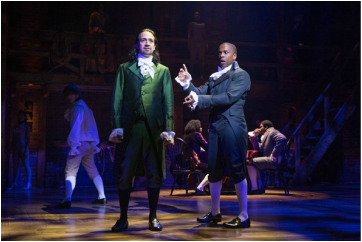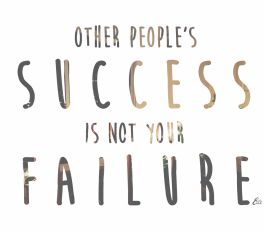|
You know about Hamilton, right? The hip-hop musical that tells the story of oft-neglected founding father, Alexander Hamilton? If you answered no, go here immediately and fall in love with what might be the greatest thing to happen to musical theater, and maybe American culture, this century.
For those of you who are also obsessed with Hamilton, you know that it’s kind of like having a middle school crush, where you find a way to insert that person into every conversation whether it fits or not. I already do that with college admissions, so it wasn’t much of a challenge to find a way to knit these two things together. I’ve basically been listening to nothing but the soundtrack for the last four months, and part of what makes it so special is how layered and ripe for deeper analysis it is. The show follows the life of Alexander Hamilton from his youth in Revolutionary War-era New York City to his death. The story is narrated by Aaron Burr, the man who would eventually kill Hamilton in a duel. Hamilton and Burr are held up side-by-side as they live shockingly parallel lives, making plain their fundamental differences. Hamilton declares throughout the show, “I am not throwing away my shot!” when he’s named George Washington’s aide-de-camp at age 19, when he almost single-handedly writes The Federalist Papers, and when he lays the foundation for our country’s financial system as Secretary of the Treasury. At every point, Hamilton is driven by his fervent belief in America’s independence, in the strength of a central federal government, in the value of speaking your mind. Burr on the other hand is more cautious. He repeats his philosophy of “Talk less. Smile more. Don’t let them know what you’re against or what you’re for.” Hamilton charges ahead, influenced only by what he feels is right and fair, while Burr sits back, surveys the field, and strategizes. I make a similar distinction to students and parents about intellectual curiosity and love of learning in the college process. Some students take AP classes and join activities and read challenging books because they love it, because they want to know more, because they’re curious. Like Hamilton, they dive headfirst into the things that matter to them, and trust that colleges will see and value their genuine enthusiasm. Other students approach high school more like Aaron Burr, as though it is a game that can be won rather than just the next academic and professional step. Aaron Burr was intelligent, accomplished, and ambitious, but his goal was winning, not making a meaningful impact. There is no special combination of classes, activities, and summer programs that equals admission to a highly selective college. Students who get accepted to these schools do so by demonstrating and articulating their curiosity in and out of the classroom. Ultimately, Alexander Hamilton is the one gracing our $10 bill, and we remember him as one of the greatest political minds in history. The only thing most people know about Aaron Burr is that he shot Hamilton. Be a Hamilton, not a Burr.
1 Comment
I was recently chatting with a parent whose child had gone through the college application process a few years ago. He was, like many people, fascinated by the constant evolution of college admissions. He was also somewhat familiar with the work that I do after hearing of a very popular independent counselor in his area. “Everyone wants to work with her because she has the highest success rate,” he said. That’s a very normal way to evaluate an athlete, or a lawyer; how often do they make the shot, or win their case? But applying to college is a lot more abstract. I started thinking about my own “success rate.”
This question doesn’t come up that often, but when it does, my immediate thought is, “What do you mean by success?” One way to define success is getting into a highly selective school, like the Ivies. But what about students who don’t apply to any of those schools, or apply and, like 90% of the students who apply, aren’t accepted. Does that make them, and their counselors, unsuccessful? In California, success is often defined as getting into a UC school, specifically Berkeley or UCLA. But the nine undergraduate schools in the UC system are remarkably similar in terms of size, location, and campus culture. So students looking for a different kind of college experience might decide that the UC system is not a good fit for them. Does that make those students, and their counselors, unsuccessful? The only universal definition I have been able to reach for success in college admissions is: to get accepted to a school you can afford, where you can pursue your academic interests, participate in or implement activities that interest you, and leave college prepared to do whatever it is you want to do next. That definition holds true for engineering, poetry, and math majors, for A, B, and C students, for future CEOs, Fulbright scholars, and nurses. So when someone asks me, “What’s your success rate?” I want to tell them, “100%,” because every single one of my students has been accepted to a school they loved, where they could thrive and excel. I just spent the last four days at our annual Collegewise retreat, this year in Cancun. We did all the normal things you would expect of a corporate retreat: cocktails and catching up, PowerPoint presentations in conference rooms, and an awards dinner on the last night. But in true Collegewise fashion, we also did things in our own irreverent style. Like the slideshow prepared by our CFO explaining next year’s financial plan by way of the Ohio State-Michigan football rivalry. Or the talent show we performed on the deck of a pirate ship in the middle of the Gulf of Mexico. Or lunch by the pool every day, where we pushed six tables together because we couldn’t bear to separate into smaller groups. But my favorite part of the retreat was the same thing I love the most about working for Collegewise: getting to learn from my brilliant and diversely-experienced colleagues.
At every session, I took notes I will refer to over and over again in the next year. We touched on an enormous range of topics, which only speaks to how knowledgeable and unique each of us are at Collegewise. Like best practices from two of our most veteran counselors, Katie and Allison, for supporting our seniors in the thick of application season, and Arun and Mamie discussing how to guide students to articulate and impactful supplement essays, Jenny and Marisela advising on transfer students, Tim explaining how to navigate the process with international applicants, and our CEO, Paul, discussing the significance of this year’s FAFSA changes. And it’s not just the presentations, but also the questions and the discussions that arise from every single counselor being completely engaged. To be a great college counselor, you have to constantly evolve your skills and your knowledge base. This is a field that changes every year, every month, every day even. And that’s what I love about it. I love getting to research video gaming as a varsity sport, and the financial aid opportunities at WUE schools, and which colleges will let you combine geology and foreign studies majors. But most of all, I love being connected to 36 people who love all those things too. |
What is the When I Was 17 Project?When I Was 17 is a blog series dedicated to collecting the varied stories of people's career paths, what they envisioned themselves doing when they were teenagers and how that evolved over the course of their lives. I started this project with the goal of illustrating that it's okay not to know exactly what you want to do when you're 17; many successful people didn't, and these are a few of their stories.
Archives
October 2020
|

